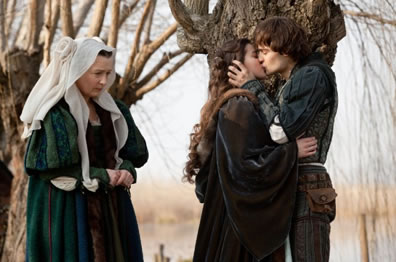Romeo and Juliet
Too Dumb for Tweens
Amber Entertainment, Echo Lake Productions, Indiana Production Company, Swarovski Entertainment (2013)
Directed by Carlo Carlei. With Hailee Steinfeld (Juliet), Douglas Booth (Romeo), Damian Lewis (Capulet), Paul Giamatti (Friar Laurence), Kodi Smit-McPhee (Benvolio), Ed Westwick (Tybalt), Christian Cooke (Mercutio), Lesley Manville (Nurse).

Had Douglas Booth been allowed to play Shakespeare's real Romeo, girls would melt. Photo courtesy of R&J Releasing, Ltd.
The moral of the story of Romeo and Juliet is that had Michelangelo fallen in love with the only daughter sprung from his only hate, we never would have had the Sistine Chapel or the statue of David. That's what I gleaned from the just-released film version of Romeo and Juliet, directed by Carlo Carlei with a screenplay by Julian Fellowes adapted from William Shakespeare's text. Romeo, Montague's only son, is a sculptor and painter in fair Verona, and he is even able to set up a nice studio in the few hours he's living in Mantua.
I'm being no sillier than this film. The real moral in this telling of Shakespeare's classic tale of doomed young love is that when you go to a cinema playing it, choose to see something like Machete Kills instead. I wish we had; pulling weeds, even, would have been a far more interesting way of spending a Saturday afternoon. I've always held that even the worst Shakespeare production has some redeeming value in our understanding and appreciation of The Bard's work. That contention has stood the test of the 350-plus stage and screen productions I've seen; this one is the first to challenge it. Or perhaps we grade this Carlei-Fellowes collaboration as something less than worst.
But I'll try to find redeeming value here. I'll try. Damian Lewis, who plays Capulet, is a Royal Shakespeare Company veteran and tremendous actor—in other things. Paul Giamatti, who plays Friar Laurence, is one of my favorite actors—in other things. Watching them here, you are reminded of the talent that helped make Band of Brothers and Homeland, Sideways and Cinderella Man such entrancing viewing. Leon Vitali as the apothecary is kind of cool in a creepy Mickey Rourke kind of way. Other highlights came when I imagined this film was really Monty Python's Romeo and Juliet, though clearly that was not the intention of Carlei and Fellowes, and my attention wandered off to thoughts of how much fun a Python take on Shakespeare would have been.
The exotic scenery and Italian location shoots by cinematographer David Tattersall and the lush costume designs of Carlo Poggioli might earn Oscar nominations, but their work is hard to see when you're cringing at the script. Douglas Booth as Romeo, in addition to being OMG cute, does speak Shakespeare's verse pretty well—he just doesn't get a lot of Shakespeare's verse to speak. Thank heavens he at least keeps the line "Night's candles are burnt out, and jocund day stands tiptoe on the misty mountain tops," for with his glistening, dark blue eyes he says those two lines mesmerizingly. So, that five seconds of this 118-minute movie is worth sitting through.
Let's be clear that other than such brief, brief moments, this movie is not Shakespeare. The story follows Shakespeare's plotline pretty closely, though it has some bothersome aberrations. Mercutio (Christian Cooke) is a Montague, not the Prince's kin, which undermines the significance of his murder. In fact, it is Mercutio who wins the tournament between the two families that starts off the play. You see, to cease the civil broils between the Montagues and Capulets, the Prince established the tournament (thus Chorus tells us), a race between two jousters trying to lance a ring as they gallop around Verona's streets. The Prince's strategy backfires, for the Montagues later make fun of Tybalt's (Ed Westwick) losing to Mercutio, and so the families are at it again in a jiffy.
Giving Mercutio to the Montagues, Fellowes adds a significant character to the Capulets' side, too: Rosaline. There's a hint of Rosaline's relation in Shakespeare's text—the guest list for Capulet's masque includes "my fair niece, Rosaline," and, notably, Mercutio, too—but Rosaline's relationship to Capulet is brought to the fore in Fellowes' version (and Mercutio dropped from the guest list). Thus, with Romeo already hitting on a Capulet long before he encounters Juliet, that whole falling in love unknowingly with your enemy aspect of the play loses its edge—you think?
The messenger, Friar Laurence's novice, fails to reach Romeo in Mantua not because plague waylays him but because he choses to help heal a poor farmer's sick child with some of the herbal pharmacology he's learned from his mentor. When he does arrive in Mantua to discover that Romeo has left, the friar-in-training says, "God's ways are hard for us to penetrate." Even the 12-year-old girls in our audience snickered at that.
That's the worst abomination of this film: the polluting of Shakespeare's text. Modernizing Shakespeare is not the issue here; if his script were tossed altogether and replaced with current vernacular, a la A Knight's Tale, it would be far more palatable than Fellowes mingling Shakespeare's original with his Shakespeare-sounding alterations. Fellowes actually manages to rob the play of its poetic power and make the dialogue more obtuse at the same time. Speeches start out with original text and suddenly foray off into huhland, like a bad actor forgetting his lines and making up substitutes. We all know that Shakespeare coined many famous sayings, so let's throw in some more profundity that sounds like things he could have written. "I thought all for the best," Romeo says (from Shakespeare) when Mercutio notes how he was hurt by Tybalt under Romeo's arm. "The best intentions pave the road to hell," Mercutio replies (from Fellowes). Mercutio goes on to claim "a plague" of the two houses though, remember, he is a Montague and is cursing himself.
The question is whether Fellowes thinks he's a better poet playwright than Shakespeare (he's not) or he really thought he was modernizing Shakespeare's text (he didn't). My conclusion is that he thought modern audiences are dumber than they really are. If the intended audience is that gaggle of 12-year-old girls sitting in front of us, they were won over the moment Booth as Romeo appears for the first time in his studio. When he turns around to greet Benvolio and we get Booth's puffed-lip, doe-eyed, soft-complexion, tousled-hair visage filling the screen, the gaggle of girls went into conniptions. Romeo could have been speaking Klingon and those girls would have followed along; if he were speaking the original Romeo's lines, they would have ended the screening in a mass of rapt putty; as he was speaking Fellowe's lines, they ended up snickering and talking derisively among themselves by the time the film entered the play's fifth act.

Nurse (Lesley Manville) stands by as Romeo (Douglas Booth) and Juliet (Hailee Steinfeld) part until night in an extraneous post-wedding scene in Carlo Carlei's film Romeo and Juliet. The wait, says Juliet, "seems a year away." "Only a year? You do not love me then," replies Romeo. Photo courtesy of R&J Releasing, Ltd,
Booth's counterpart, Hailee Steinfeld as Juliet, also gets her big awww! isn't she cute full-frame moment when she first appears. Well, she's cute but not nearly as pretty as Booth. Nor is she as talented. Yes, Steinfeld is the amazing young actress who earned an Oscar nomination for her portrayal of Mattie Ross in True Grit, handling that movie's peculiar language patterns as adeptly as her costars Jeff Bridges, Josh Brolin, and Matt Damon. That Steinfeld could have brought home the definitive Juliet. The one that showed up for this movie, though, speaks the verse (both Fellowes' and Shakespeare's) flatter than a high school jock angling for a D in English class. She runs through her "Wherefore art thou Romeo" speech as if she were reading an e-mail to herself.
OK, this movie does have one, enduring redeeming moment: the end. I don't really mean to seem ironic in saying that. As the bodies of Romeo and Juliet lie in state in a cathedral funeral service attended by all of Verona (the movie's final departure from Shakespeare), Benvolio (Kodi Smit-McPhee, way young for the part but way better than much of the rest of the cast) leaves his pew, walks between the biers bearing the two dead lovers, and places Juliet's hand in Romeo's. The last scene is an overhead shot of those two hands united in death. Oh, did two of the 12-year-olds in front of us weep at that; I even felt a genuine tugging at my eyes. What a great image to end this great play. What an emblem of the true tragedy of this movie, too; had Carlei sans Fellowes filmed Shakespeare's Romeo and Juliet, we might have had a cinematic masterpiece instead of being left with the nagging truth that Monty Python would have done it all better.
Eric Minton
October 22, 2013
Comment: e-mail editorial@shakespeareances.com
Start a discussion in the Bardroom



 Find additional Shakespeareances
Find additional Shakespeareances